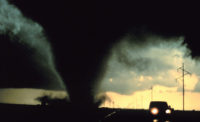 Our respiratory tracts are affected by the air we breathe, and changes in season, temperature and air quality can increase Chronic Obstructive Pulmonary Disease (COPD) symptoms. During the winter, cold air can trigger a reaction that constricts the airway and decreases air flow into the lungs. In the summer, breathing dense, hot, humid air can create more resistance to airflow in the airway. Indoor and outdoor pollutants can also trigger airway irritation.
Our respiratory tracts are affected by the air we breathe, and changes in season, temperature and air quality can increase Chronic Obstructive Pulmonary Disease (COPD) symptoms. During the winter, cold air can trigger a reaction that constricts the airway and decreases air flow into the lungs. In the summer, breathing dense, hot, humid air can create more resistance to airflow in the airway. Indoor and outdoor pollutants can also trigger airway irritation.
Cold weather
As you prepare for winter, it is it important to make sure you are ready for storms, illness such as the flu, and cold air, all of which can worse COPD symptoms. Tips for cold weather include:
• When it is cold, wear a facemask or a scarf that wraps around your mouth and nose.
• Get a flu shot every year.
• Stock up on non-perishable food items in case you cannot get to the store.
• Designate someone as a contact person who calls to check up on you.
• On cold days, in-home exercises and activities are best.
• Make sure that your furnace is in working order.
Warm weather
During the summer, try to avoid exposure to hot and humid air. Stay active indoors in an air-conditioned environment. Tips for warm weather include:
• Make sure that your home and car air conditioners are in working order.
• When you can’t walk outside, consider taking a trip to your local mall or other indoor activities.
• Be alert to the Air Quality Index on the hottest summer days.
Indoor air pollutants
Indoors, COPD can be affected by a variety of irritants, including: tobacco smoke, animal dander, mold, dust, pollen, kerosene heaters or lamps, pressed wood products, pesticides, household cleaning products and substances with irritating odors.
To help reduce symptoms:
• Avoid tobacco smoke.
• Avoid smoke from wood-burning stoves.
• Reduce mold and dust mites in the home.
• Keep pets out of sleeping areas.
• Have heating and cooling systems inspected yearly.
• Fix water leaks promptly.
Outdoor pollutants
Poor air quality that affects COPD can occur during cold or warm weather. Outdoors, irritants can include pollen, particle pollution and ozone. The Illinois Environmental Protection Agency (IEPA) provides the public with air quality information and how it can affect health with their EnviroFlash Program.
Sign up to receive air quality alerts at illinois.enviroflash.info. Find out more information by calling the Air Quality Index Report for Chicago Metropolitan Area at 1-708-865-6320.
Source: Respiratory Health Association’s COPD Initiative promotes COPD awareness, education and resources. For information, contact Eileen Lowery at 312-628-0217 or elowery@lungchicago.org.






